高教版中职英语(基础模块 第2册)Unit 3《Have you ever done a part time job》2PPT课件
- 格式:ppt
- 大小:1.93 MB
- 文档页数:26
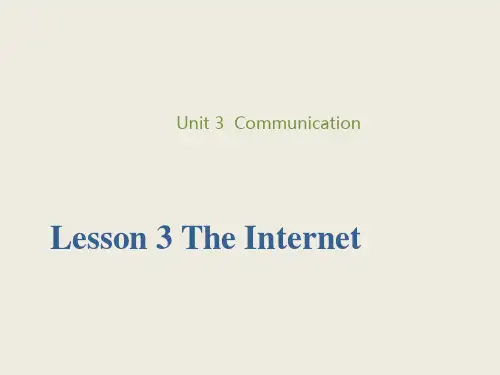
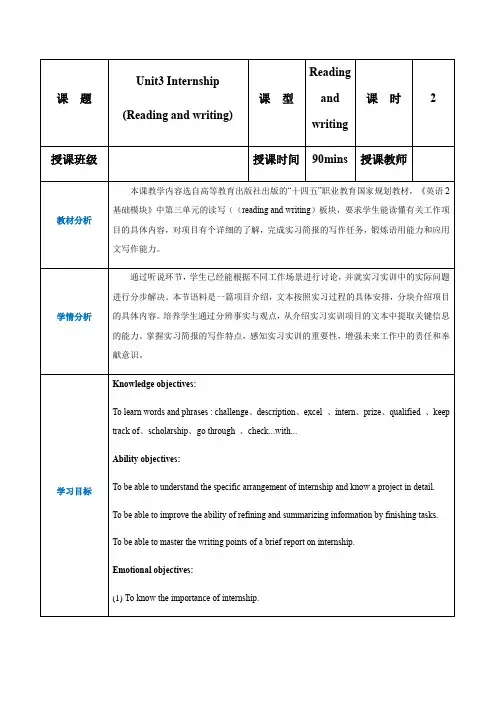
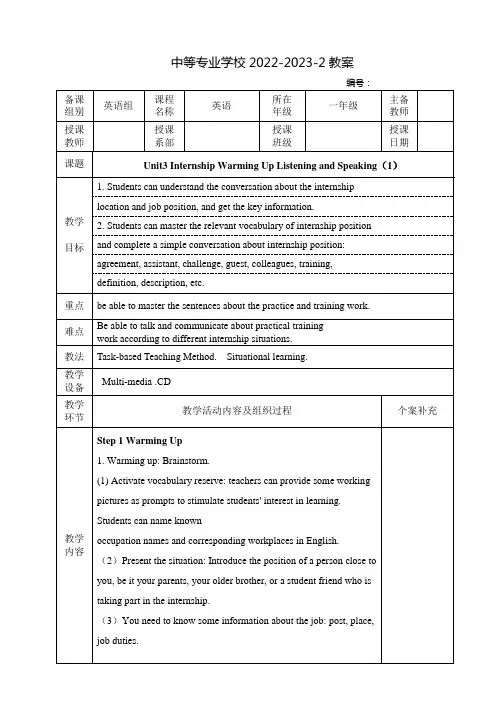


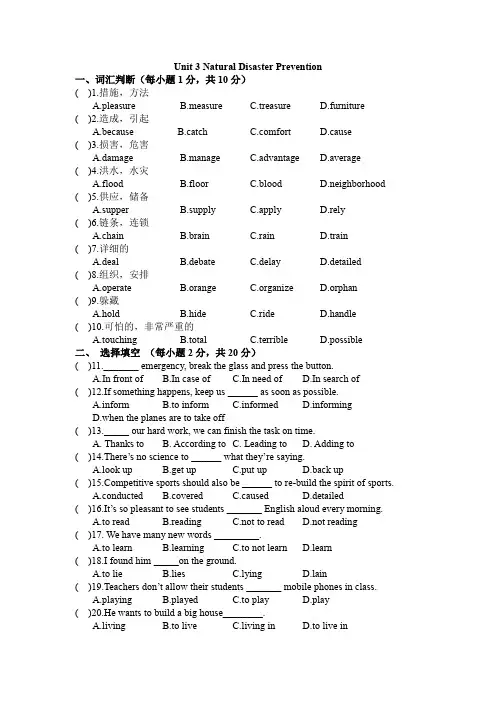
Unit 3 Natural Disaster Prevention一、词汇判断(每小题1分,共10分)( )1.措施,方法A.pleasureB.measureC.treasureD.furniture ( )2.造成,引起A.becauseB.catchfortD.cause( )3.损害,危害A.damageB.manageC.advantageD.average ( )4.洪水,水灾A.floodB.floorC.bloodD.neighborhood ( )5.供应,储备A.supperB.supplyC.applyD.rely( )6.链条,连锁A.chainB.brainC.rainD.train( )7.详细的A.dealB.debateC.delayD.detailed ( )8.组织,安排A.operateB.orangeanizeD.orphan( )9.躲藏A.holdB.hideC.rideD.handle( )10.可怕的,非常严重的A.touchingB.totalC.terribleD.possible二、选择填空(每小题2分,共20分)( )11._______ emergency, break the glass and press the button.A.In front ofB.In case ofC.In need ofD.In search of( )12.If something happens, keep us ______ as soon as possible.rmB.to informrmedrmingD.when the planes are to take off( )13._____ our hard work, we can finish the task on time.A. Thanks toB. According toC. Leading toD. Adding to( )14.There’s no science to ______ what they’re saying.A.look upB.get upC.put upD.back up( )petitive sports should also be ______ to re-build the spirit of sports.A.conductedB.coveredC.causedD.detailed( )16.It’s so pleasant to see students _______ English aloud every morning.A.to readB.readingC.not to readD.not reading( )17. We have many new words _________.A.to learnB.learningC.to not learnD.learn( )18.I found him _____on the ground.A.to lieB.liesC.lyingin( )19.Teachers don’t allow their students _______ mobile phones in class.A.playingB.playedC.to playD.play( )20.He wants to build a big house________.A.livingB.to liveC.living inD.to live in三、补全对话(每小题2分,共20分)( )21.—I’ve got to cancel my travelling plan because of the flood.—_____________A. What a pityB. It’s good newsC. Be carefulD. Have a good trip( )22.—Steven, why are you so unhappy?—_____________.A. Yes, I’m sadB. I heard a piece of good newsC. I just heard of an earthquakeD. Don’t give up( )23.—How about donating some money to the disaster area?—_____________.A.Cheer upB.Best wishesC.Good luckD.Good idea ( )24.—Have you ever experienced a flood?—_________.A.Yes, I doB.No, I don’tC.Yes, I haveD.No, I have ( )25.—Oh, thank God. Was anyone hurt?—_____________.A.No, three people were killedB.Yes,three people were killed and five were injuredC.Take care of yourselfD.Thank you for saying so( )26.—Fortunately, no one died.—____________.A.No problemB.That’s greatC.I’m sorry about thatD.It’s bad news( )27.—You look terrible. _______________—A powerful earthquake struck Ya’an of Sichuan.A.What’s the matter with you?B.How are you?C.How do you do?D.What about you?( )28.—I got the news from CCTV that it was a level seven earthquake.—_____________.A.I beg your pardonB.I’m sorry to hear thatC.What a lovely dayD.Don’t give up( )29.—Life is so hard these days!—__________. Things are not so bad as they seem.A. That’s rightB.Forget itC. Cheer upD.That’s not a big deal( )30.—I’m scared. There is nobody around here.—__________, we can turn to others through our cellphones.A.Well doneB.Don’t worryC.That’s a good ideaD.What a shame四、阅读理解(每小题2分,共20分)AMany animals do strange things before an earthquake.This news may be important.Earthquakes can kill people and knock down homes.The animals may help to save lives.Some animals make a lot of noise before an earthquake.Farmers have told about this.Dogs that are usually quiet have started to howl.Horses on farms have run around in circles.Mice have left their holes and run away.Cows have given less milk.In a town in Italy,cats raced down the street in a group.That happened only a few hours before an earthquake.In San Francisco,a man kept tiny pet frogs.One Sunday,the frogs jumped around more than ever.They made loud noises,like bigger frogs.That night,an earthquake struck the city.People want to know when an earthquake is coming.Then they could get away safely.Right now,there is no sure way to know ahead of time.Maybe the best way is to watch the animals.( )31.This story is mostly about___________.A.how animals act before an earthquakeB.how an earthquake startsC.how mice leaves their homesD.when an earthquake begins( )32.Before an earthquake,quiet dogs________.A.ran awayB.started to howlC.climbed treesD.race down streets( )33. Before an earthquake, the frogs________.A. sangB. left their homesC. jumped aroundD. become quiet( )34. There have been earthquakes in_________.A. most countriesB. Italy and San FranciscoC. Chicago and SpainD. all the western countries( )35. People want to____________.A. be in earthquakeB. find out early about an earthquakeC. run around in circlesD. get away from earthquakesBWhen disaster happens,you might find yourself without water,gas and electricity.You might even need to leave your home right away.So you are supposed to plan for the bad situations before the disaster comes. Here are some suggestions.First,have a family meeting. Plan a way to get your family members together if they can’t find each other after the disaster. Choose two places for everyone to go to if it isn't safe to return home.The first should be near your house.You can go there in an emergency like a fire.The second meeting place should be outside your neighborhood.Next,choose a person outside your area who can help your family get in touch with each other. After a disaster,it is often easier to communicate over a long-distance call than a local one.The person can pass messages between your family members.Then,get a family disaster kit ready.It should include things your family needs.Itcan help you survive(生存)at least for three days like bread,water,medicine and things like that.Put them in a bag so you can carry it if you leave in a hurry.When doing it,remember that different people have different needs.Include special things necessary for elderly of young members of your family.Finally,practice your emergency plan,and update it as necessary.You may not be able to stop disasters,but with a plan you can be helped.( )36. There are ______suggestions mentioned in the passage.A.3B.4C.5D.6( )37. You can’t return home after the disaster because it’s_______.A.farB.nearC.safeD.dangerous( )38. The writer suggests choosing a person outside your area to_______.A.send food and water to your familyB.help your family move to a safe placeC.choose two places for your family to go toD.help your family get in touch with each other( )39. The underlined word “kit”probably means_______.A.应急用品B.救护车C.搜救犬D.防毒面具( )40.What’s the best title for the passage?A.How to Deal With a DisasterB.Why There Was a DisasterC.How to Stop a DisasterD.A Disaster Is Coming五、完形填空(每小题1分,共10分)The earthquake is a kind of terrible 41 disaster. When an earthquake happens,a lot of houses 42 down, and many people are killed.Sometimes the earthquake 43 many children homeless. They lost their parents because their 44 are killed in the earthquake. They have no schools to go to because their schools are destroyed. They have to 45 in the tents for some time. Life for those who suffer 46 the earthquake is very hard. People even don’t have 47 food or water. They will live a hard life for some time.What should we do when an earthquake happens? There are some 48 to keep us safe.One of the safest ways is that we 49 run to the outside. We should not stay inside the house.If we are hurt, we should wait for help. We should also try to 50 other people if we can.( )41.A.good B.natural C.easy D.short( )42.A.break e C.turn D.fall( )43.A.makes B.damages C.prepares D.hits( )44.A.friends B.mothers C.parents D.neighbors( )45.A.live B.stay C.share D.wait( )46.A.from B.to C.with D.in( )47.A.delicious B.enough C.less D.clean( )48.A.paths B.problems C.roads D.ways( )49.A.had to B.needed C.must D.should( )50.A.talk B.give C.help D.hurt六、汉译英(每小题4分,共20分)51.准备足够的饮水以免缺水。
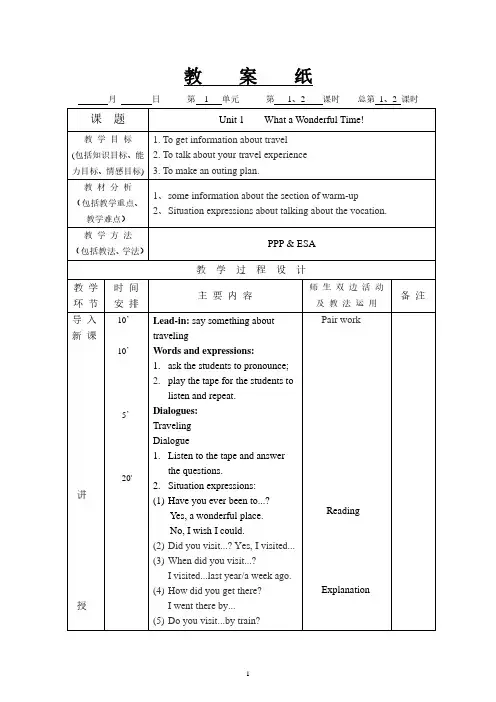
月日第 1 单元第1、2 课时总第1、2 课时课题Unit 1 What a Wonderful Time!教学目标(包括知识目标、能力目标、情感目标)1. To get information about travel2. To talk about your travel experience3. To make an outing plan.教材分析(包括教学重点、教学难点)1、some information about the section of warm-up2、Situation expressions about talking about the vocation.教学方法(包括教法、学法)PPP & ESA教学过程设计教学环节时间安排主要内容师生双边活动及教法运用备注导入新课讲授10’10’5’20'Lead-in: say something abouttravelingWords and expressions:1.ask the students to pronounce;2.play the tape for the students tolisten and repeat.Dialogues:TravelingDialogue1.Listen to the tape and answerthe questions.2.Situation expressions:(1)Have you ever been to...?Yes, a wonderful place.No, I wish I could.(2)Did you visit...? Yes, I visited...(3)When did you visit...?I st year/a week ago.(4)How did you get there?I went there by...(5)Do you visit...by train?Pair workReadingExplanation环节安排主要内容及教法运用备注新课归纳总结布置作业15’5’5’10’5’5’No, I visited the place on foot..(6) How do you like it?exciting...nguage points:(1)a bit(2)no matter(3)go wrong(4)admission ticket4.Practice: finish the chartfinish the dialogue5.Practice the dialogues in pairs.6.Make dialogues about travelingAct out the dialogues in pairs.Sum up:1.Situation expressions;nguage pointsAssignment:1.Read the new words anddialogues;2.Make a dialogue abouttraveling.HomeworkExplanationPracticeWritingOral考勤见教学日志教学体会(教学环节一般包括复习旧课、导入新课、讲授新课、学生操作、教师点评、归纳总结、布置作业等)月日第 1 单元第3、4 课时总第3、4 课时课题Unit 1 what a wonderful time!教学目标(包括知识目标、能力目标、情感目标)1、To learn the passage.2、To understand the passage.教材分析(包括教学重点、教学难点)1、Words and expressions;2、Situation expressions.教学方法(包括教法、学法)PPP & ESA教学过程设计教学环节时间安排主要内容师生双边活动及教法运用备注复习讲授15’10’5’15’5’Review:1. Read and identify new words;2. Act out the dialogues that theymade.Words and expressions:1. Ask the students to pronounce;2. Play the tape for the students tolisten and repeat.Passage:1. Pre-reading questions;2. Listen to the tape and answer thequestions;3. Situation questions:(1) We didn't prepare well for thetrip.(2)We left our flight ticket at home.(3) We were lucky that the fire atthe hotel was put out soon.(4)The bad experience didn't ruinour holiday after all.Pair workOralReadingExplanation环节安排主要内容及教法运用备注新课归纳总结布置作业20’10’5’5’4. Language points:(1)prepare for(2)no matter(3)go wrong(4)arrive at(5)fall asleep(6)put out(7)in time(8)be determined to(9)at the hotel(10)in time5. Read the passage and askquestions.Sum up:1. Situation expressions;2. Words and structures.Assignment:.Read the new words and passageHomeworkExplanationPracticeWritingOral考勤见教学日志教学体会(教学环节一般包括复习旧课、导入新课、讲授新课、学生操作、教师点评、归纳总结、布置作业等月日第 1 单元第5、6 课时总第5、6 课时课题Unit 1 what a wonderful time!教学目标(包括知识目标、能力目标、情感目标)1、To learn some phonetics2、To learn the grammar "Exclamations"教材分析(包括教学重点、教学难点)1、some phonetics2、some use of "Exclamations"教学方法(包括教法、学法)Combined教学过程设计教学环节时间安排主要内容师生双边活动及教法运用备注复习讲授10’10’15’Review:1. Read and identify new words;2. Read the passage;3. have a dictation.Phonetics:1、Listen and read the phoneticsand the words.2、Put some words in the properbasket according to thepronunciation of the endings.Grammar: ExclamationWe use exclamations to express oursurprise, anger, or other strongemotions. Exclamations are oftenconstructed with how/what or withso/such. For example:How cold it is!You are so sweet!Pair worklisteningExplanation。
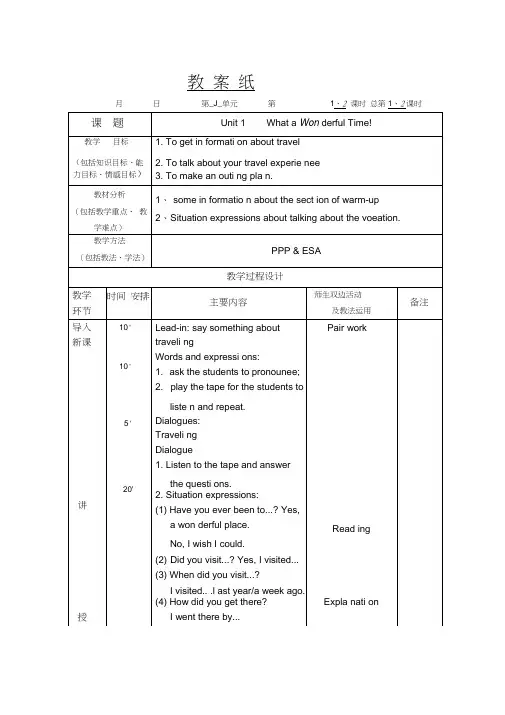
教案纸月日第_J_单元第1、2课时总第1、2课时教案纸月日第_J_单元第2、2课时总第1、2课时(教学环节一般包括复习旧课、导入新课、讲授新课、学生操作、教师点评、归纳总结、布置作业等)(教学环节一般包括复习旧课、导入新课、讲授新课、学生操作、教师点评、归纳总结、布置作业等教案纸月日第 1 单元第5、6 课时总第5、6课时(教学环节一般包括复习旧课、导入新课、讲授新课、学生操作、教师点评、归纳总结、布置作业等教案纸月日第 1 单元第5、6 课时总第7、6课时(教学环节一般包括复习旧课、导入新课、讲授新课、学生操作、教师点评、归纳总结、布置作业等(教学环节一般包括复习旧课、导入新课、讲授新课、学生操作、教师点评、归纳总结、布置作业等)(教学环节一般包括复习旧课、导入新课、讲授新课、学生操作、教师点评、归纳总结、布置作业等)教案纸月日第2单元第3、4 课时总第11、10课时(教学环节一般包括复习旧课、导入新课、讲授新课、学生操作、教师点评、归纳总结、布置作业等)教案纸月日第2单元第3、4 课时总第13、10课时(教学环节一般包括复习旧课、导入新课、讲授新课、学生操作、教师点评、归纳总结、布置作业等)(教学环节一般包括复习旧课、导入新课、讲授新课、学生操作、教师点评、归纳总结、布置作业等教案纸月日第2单元第5、6 课时总第16、12课时教案纸月日第2单元第5、6 课时总第17、12课时(教学环节一般包括复习旧课、导入新课、讲授新课、学生操作、教师点评、归纳总结、布置作业等)教案纸月日第 3 单元第3、4 课时总第19、16课时(教学环节一般包括复习旧课、导入新课、讲授新课、学生操作、教师点评、归纳总结、布置作业等)(教学环节一般包括复习旧课、导入新课、讲授新课、学生操作、教师点评、归纳总结、布置作业等)教案纸月日第 3 单元第3、4 课时总第23、16课时(教学环节一般包括复习旧课、导入新课、讲授新课、学生操作、教师点评、归纳总结、布置作业等教案纸月日第 3 单元第5、6 课时总第25、18课时教案纸月日第 3 单元第5、6 课时总第26、18课时(教学环节一般包括复习旧课、导入新课、讲授新课、学生操作、教师点评、归纳总结、布置作业等)(教学环节一般包括复习旧课、导入新课、讲授新课、学生操作、教师点评、归纳总结、布置作业等)教案纸月日第 4 单元第1、2课时总第29、20课时(教学环节一般包括复习旧课、导入新课、讲授新课、学生操作、教师点评、归纳总结、布置作业等)教案纸月日第 4 单元第1、2课时总第31、20课时(教学环节一般包括复习旧课、导入新课、讲授新课、学生操作、教师点评、归纳总结、布置作业等)(教学环节一般包括复习旧课、导入新课、讲授新课、学生操作、教师点评、归纳总结、布置作业等教案纸月日第 4 单元第5、6 课时总第34、24课时教案纸月日第 4 单元第5、6 课时总第35、24课时(教学环节一般包括复习旧课、导入新课、讲授新课、学生操作、教师点评、归纳总结、布置作业等)教案纸月日第 5 单元第3、4 课时总第37、28课时(教学环节一般包括复习旧课、导入新课、讲授新课、学生操作、教师点评、归纳总结、布置作业等)(教学环节一般包括复习旧课、导入新课、讲授新课、学生操作、教师点评、归纳总结、布置作业等)教案纸月日第 5 单元第3、4 课时总第41、28课时(教学环节一般包括复习旧课、导入新课、讲授新课、学生操作、教师点评、归纳总结、布置作业等教案纸月日第 5 单元第5、6 课时总第43、30课时教案纸月日第 5 单元第5、6 课时总第44、30课时(教学环节一般包括复习旧课、导入新课、讲授新课、学生操作、教师点评、归纳总结、布置作业等)(教学环节一般包括复习旧课、导入新课、讲授新课、学生操作、教师点评、归纳总结、布置作业等)教案纸月日第 6 单元第1、2课时总第47、32课时(教学环节一般包括复习旧课、导入新课、讲授新课、学生操作、教师点评、归纳总结、布置作业等)教案纸月日第 6 单元第1、2课时总第49、32课时(教学环节一般包括复习旧课、导入新课、讲授新课、学生操作、教师点评、归纳总结、布置作业等)。
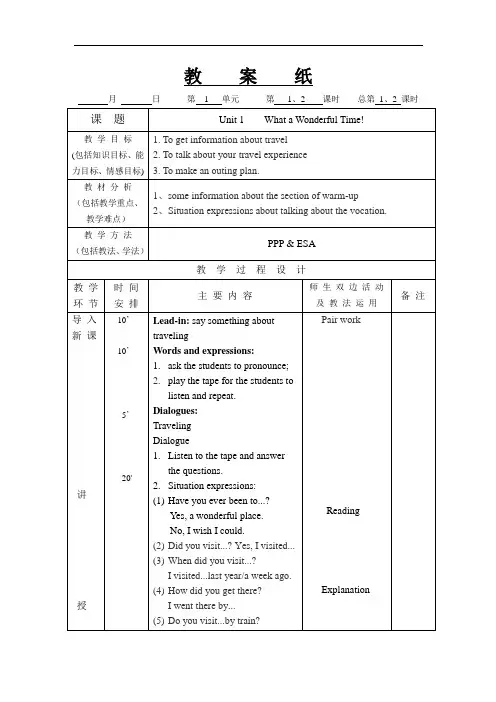
月日第 1 单元第1、2 课时总第1、2 课时(教学环节一般包括复习旧课、导入新课、讲授新课、学生操作、教师点评、归纳总结、布置作业等)月日第 1 单元第3、4 课时总第3、4 课时(教学环节一般包括复习旧课、导入新课、讲授新课、学生操作、教师点评、归纳总结、布置作业等月日第 1 单元第5、6 课时总第5、6 课时(教学环节一般包括复习旧课、导入新课、讲授新课、学生操作、教师点评、归纳总结、布置作业等)月日第 2 单元第1、2 课时总第7、8 课时(教学环节一般包括复习旧课、导入新课、讲授新课、学生操作、教师点评、归纳总结、布置作业等)月日第 2 单元第3、4 课时总第9、10 课时(教学环节一般包括复习旧课、导入新课、讲授新课、学生操作、教师点评、归纳总结、布置作业等月日第 2 单元第5、6 课时总第11、12 课时(教学环节一般包括复习旧课、导入新课、讲授新课、学生操作、教师点评、归纳总结、布置作业等)月日第 3 单元第1、2 课时总第13、14 课时(教学环节一般包括复习旧课、导入新课、讲授新课、学生操作、教师点评、归纳总结、布置作业等)月日第 3 单元第3、4 课时总第15、16 课时(教学环节一般包括复习旧课、导入新课、讲授新课、学生操作、教师点评、归纳总结、布置作业等月日第 3 单元第5、6 课时总第17、18 课时(教学环节一般包括复习旧课、导入新课、讲授新课、学生操作、教师点评、归纳总结、布置作业等)月日第 4 单元第1、2 课时总第19、20 课时(教学环节一般包括复习旧课、导入新课、讲授新课、学生操作、教师点评、归纳总结、布置作业等)教案纸月日第 4 单元第3、4 课时总第21、22 课时(教学环节一般包括复习旧课、导入新课、讲授新课、学生操作、教师点评、归纳总结、布置作业等教案纸月日第 4 单元第5、6 课时总第23、24 课时(教学环节一般包括复习旧课、导入新课、讲授新课、学生操作、教师点评、归纳总结、布置作业等)教案纸月日第 5 单元第1、2 课时总第25、26 课时(教学环节一般包括复习旧课、导入新课、讲授新课、学生操作、教师点评、归纳总结、布置作业等)教案纸月日第 5 单元第3、4 课时总第27、28 课时(教学环节一般包括复习旧课、导入新课、讲授新课、学生操作、教师点评、归纳总结、布置作业等教案纸月日第 5 单元第5、6 课时总第29、30 课时(教学环节一般包括复习旧课、导入新课、讲授新课、学生操作、教师点评、归纳总结、布置作业等)月日第 6 单元第1、2 课时总第31、32 课时(教学环节一般包括复习旧课、导入新课、讲授新课、学生操作、教师点评、归纳总结、布置作业等)月日第 6 单元第3、4 课时总第33、34 课时(教学环节一般包括复习旧课、导入新课、讲授新课、学生操作、教师点评、归纳总结、布置作业等月日第 6 单元第5、6 课时总第35、36 课时(教学环节一般包括复习旧课、导入新课、讲授新课、学生操作、教师点评、归纳总结、布置作业等)月日第7 单元第1、2 课时总第37、38 课时(教学环节一般包括复习旧课、导入新课、讲授新课、学生操作、教师点评、归纳总结、布置作业等)月日第7 单元第3、4 课时总第39、40 课时(教学环节一般包括复习旧课、导入新课、讲授新课、学生操作、教师点评、归纳总结、布置作业等月日第7 单元第5、6 课时总第41、42 课时(教学环节一般包括复习旧课、导入新课、讲授新课、学生操作、教师点评、归纳总结、布置作业等)月日第8 单元第1、2 课时总第43、44 课时(教学环节一般包括复习旧课、导入新课、讲授新课、学生操作、教师点评、归纳总结、布置作业等)月日第8 单元第3、4 课时总第45、46 课时(教学环节一般包括复习旧课、导入新课、讲授新课、学生操作、教师点评、归纳总结、布置作业等月日第8 单元第5、6 课时总第47、48 课时(教学环节一般包括复习旧课、导入新课、讲授新课、学生操作、教师点评、归纳总结、布置作业等)月日第9 单元第1、2 课时总第49、50 课时(教学环节一般包括复习旧课、导入新课、讲授新课、学生操作、教师点评、归纳总结、布置作业等)。
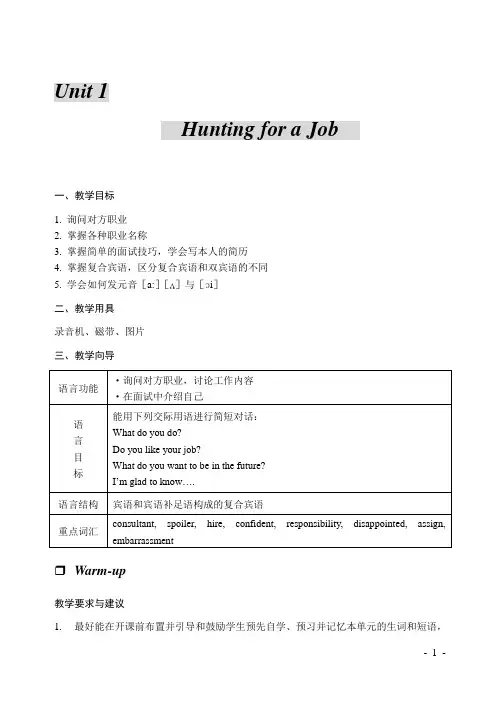
Unit 1Hunting for a Job一、教学目标1. 询问对方职业2. 掌握各种职业名称3. 掌握简单的面试技巧,学会写本人的简历4. 掌握复合宾语,区分复合宾语和双宾语的不同5. 学会如何发元音[a:][ʌ]与[ɔi]二、教学用具录音机、磁带、图片三、教学向导Warm-up教学要求与建议1.最好能在开课前布置并引导和鼓励学生预先自学、预习并记忆本单元的生词和短语,英语(基础模块)第2册教学参考书在Warm-up中涉及一些。
2.提前布置学生预习单词或在课上指导学生看图片,进行配对。
在课上引导学生根据图片记住各种职业名称,练习如何询问对方的职业。
3.分角色问答各自的职业,鼓励学生提更多有关职业的问题。
❒Pronunciation Practice教授学生练习元音[a:][ʌ]与[ɔi],同时可以多举一些常见的带有这三个元音的例子,进行对比。
❒Listening and Speaking一、教学重点根据A,B两段对话,要求学生进行模仿练习二、教学建议1. 根据课文对话来学习。
2. 并学习新的英语单词。
3. 角色扮演(Role Play)(1) 明确口语活动的任务,要求学生仔细阅读Dialogue。
必要时可做简单的对话示范。
(2) 学生成对活动,轮流作Speaker A、Speaker B。
(3) 教师巡视全班,聆听学生的对话,并解答学生提出的问题。
(4) 挑出几个学生和老师做模拟招聘会。
(5) 总结学生的表现,并及时纠正学生中出现的错误。
三、练习参考答案A Listen and fill in the blanksinterview position reasonable excited opportunity handle make good luckB2. Answer the questions(1) Lily is applying for a position of accountant.(2) Lily worked in Thomas company 4 months ago.(3) She was responsible for checking the balances, paying the bills, transferring money and soon.Unit 1 Hunting for a Job3. Complete the following sentences.(1) in her place(2) business(3) working(4) a good education.(5) white-collar4. 略5. D A A B D听力原文A2. Listen and fill in the blanks.I’m going to have an interview for a job tomorrow. It is a position in a trade company. The company offers a reasonable salary. I am very excited. It is a great opportunity for me to start my career. I think I can handle this job very well. I will make a progress if I can work in this position. But I must get this job first. So wish me good luck.B3. Complete the following sentences.(1) Could you work in her place?(2) What business are you in?(3) I’m tired of working all day.(4) He has the advantage(优势) of a good education.(5) He has a white-collar job.5. Listen to the dialogue and answer the questions.Miss Smith:Good morning, Mr. Sharp. I’m really sorry I’m late.Mr. Sharp:You’re late every morning. Miss Smith. You were late on Tuesday and yesterday. Miss Smith:But it wasn’t my mistake. I stood in the rain for an hour this morning. I waited and waited for a bus, and then when a bus came, it was full.Mr. Sharp:How about yesterday?Miss Smith:Well, I came by taxi yesterday and…Mr. Sharp:And you were still late! And the day before yesterday?Miss Smith:On Tuesday I went to see the doctor and waited for two hours there.Mr. Sharp:And tomorrow, Miss Smith.英语(基础模块)第2册教学参考书❒Language Bank教授学生练习记忆这些日常口语,也可让学生自行学习,然后课后抽查。

英语基础模块2知识清单(共14页)--本页仅作为文档封面,使用时请直接删除即可----内页可以根据需求调整合适字体及大小--英语基础模块2知识清单Unit laughed into tears.一、重点短语the zoo 去动物园 apples 摘苹果 the mountains 爬山the beach 在沙滩上 great fun 玩得高兴 swimming 去游泳oneself 玩得高兴 to do sth 志愿做… a very big snowman堆雪人and dry 又干又冷 with housework at home在家帮忙做家务hesitation毫不犹豫 ill 生病 to go 志愿做。
an hour 半个小时 into tears 笑出眼泪him a shopping list 给他列购物清单 in bed 躺在床上day before yesterday 前天 online 网上聊天amusing story 一个有趣的故事 the chores 做家务 23. read aloud 大声朗读二、重点句型1How was your vacation你的假期怎么样was the weather like in……的天气怎么样went sailing last summer. 去年夏天他们乘帆远航去了prefer walking to cycling 比起骑自行车,我更喜欢走路spent all day in watching football .杰克花费一整天时间看足球did you do last weekend 上周末你做了什么?一般过去式(I)Unit2. I saw a terrible movie一、重点短语2he Internet 上网 computer games 玩电脑游戏 a movie 看电影to the gym 去体育馆 to a club 去俱乐部through the best part 电影院睡觉.错过电影最精彩的部分movie called…一部名叫…的电影 special 没什么特别的way of relaxing 一种放松的方式 else 还有其他什么事吗the time 一直 is a waste of time to do…干……是在浪费时间her spare time 在他空闲时间 museum 当地博物馆a snowman 堆雪人 a film 看电影opera 肥皂剧 program 电视节目 great 听起来不错二、重点句子did you do last weekend?你上周末做了什么?do you think of the movie 你认为这部电影怎么样story is so moving 故事很感人you do anything special你做什么特别的事情了吗type of movie did you like in the past?你过去喜欢看什么类型的电影preferred horror films at the time 呢个时候我喜欢看恐怖电影of the most famous rock bands in the world 世界上最著名的摇滚乐队之一 and hours sitting before a computer 我花了很长时间坐在电脑前Mary see a great movie last Saturday?他上周六去看电影了吗?do you like……怎么样?about doing sth干……怎么样一般过去式(II)Unit3. Have you ever done a part time job?3一、重点短语confident of…对……有信心 confidence in …对……有信心at sports 擅长体育 with directions 方向感比较好with your hands 动手能力强 interview 工作面试the test 通过测试 English 英语很流利a computer major student 作为一个计算机专业的学生communication skills 良好的交际能力job 兼职工作 interview 工作面试good communication skills 有良好的交际能力experience 工作经历 soon as possible 尽快a part-time job 做兼职工作 to work under pressure 在压力之下工作的能力 English 口语 least 至少 for 寻找more information 更多的信息 soon as possible 尽快 23..don’t mind working …不介意做…… for 申请you are interested 如果你感兴趣的话 to another city 飞到其他城市 of a big company 一家大公司的经理teacher 幼儿园老师 school teacher 小学老师hunting 找工作 30..as soon as possible 尽快二、重点句子are your strong points 你的强项/优势是什么2. Look for a salesperson 找一个销售的工作for the position 申请职位 4. Graduated form …毕业于……have done my homework.我必须要做作业you think you are qualified this job 你认为你适合这个工作吗?you please introduce yourself 你能介绍一下自己吗you have any experience in this field 你有这方面的工作经历吗you like working with an exciting new company 你想在这家新公司工作吗10 Are you looking for a part-time job 你在找兼职工作吗?you like something to eat 你想要点吃的东西吗4Unit4. I’ve tried all the means of transportation.一、重点短语the subway 乘地铁。
(完整版)职高英语基础模块第二册单元测试卷第二单元职高英语基础模块第二册单元测试卷Unit2. What an amazing place!(本卷100分,时间60分钟)第一部分英语基础知识运用第一节行业通用专业英语词汇释义(每小题1.5分,共15分)从B栏所给的10个中文选项中选出A栏中行业通用英语专业词汇的正确释义。
(A)(B)( ) 1. capital A. 惯例( ) 2. unique B. 仙境( ) 3. national C. 经济( ) 4. square D. 油画( ) 5. economy E. 海滩( ) 6. fairyland F. 广场( ) 7. symbol G. 国家的( ) 8. beach H. 独特的( ) 9. painting I. 首都( ) 10. ritual J. 象征第二节单项选择(每小题1分,共15分)从A、B、C、D四个选项中选出一个符合题意的最佳选项.( ) 11. --- ___ did you find the city?--- It’s really great.A. WhatB. WhichC. HowD. Who( ) 12. The traffic ___ very busy during that time.A. isC. areD. were( ) 13. Kangaroos are unique ____ Australia.A. forB. inC. toD. from( ) 14. ____ amazing place!A. WhatB. How a/anC. HowD. What a/an( ) 15. It’s the world’s second ____ country by total area.A. largeB. largerC. largestD. the largest( ) 16. The fairy tale is an important part of ___ culture.A. itsB. itC. it’sD. itself( ) 17. Tulips are ___ symbol of The Netherland.A. otherB. anotherC. the otherD. the others( ) 18. ----Have you ever been to Qingdao?---- Yes. I ___ there last summer.B. has beenC. have beenD. went( ) 19. The Bund ___ Shanghai is crowed ____ both locals and tourists.A. with; inB. of; withC. of; withD. with; of( ) 20. More than 24,600 tourists visited the Summer Palace ___ 1st October,A. atB. inC. forD. on( ) 21. Lucy worked as part-time tour guide during the holiday, ___ she got 2,000 yuan a month.A. alsoB. butC. orD. and( ) 22. I was really impressed ___ the Leaning T ower of Pisa.A. byB. forC. withD. of( ) 23. Do you get the chance ___ the area?A. to visitB. visitC. visitedD. visiting( ) 24. In the country you can see a lot of ____ colored tulips.A. brightB. brightlyC. beautifulD. warm( ) 25. People there are nice and ___.A. friendsB. friendlyC. unfriendlyD. friend第三节完形填空(每小题1.5分,共15分)阅读下面文章,从每题所给的A、B、C、D四个选项中选出一个最佳选项。